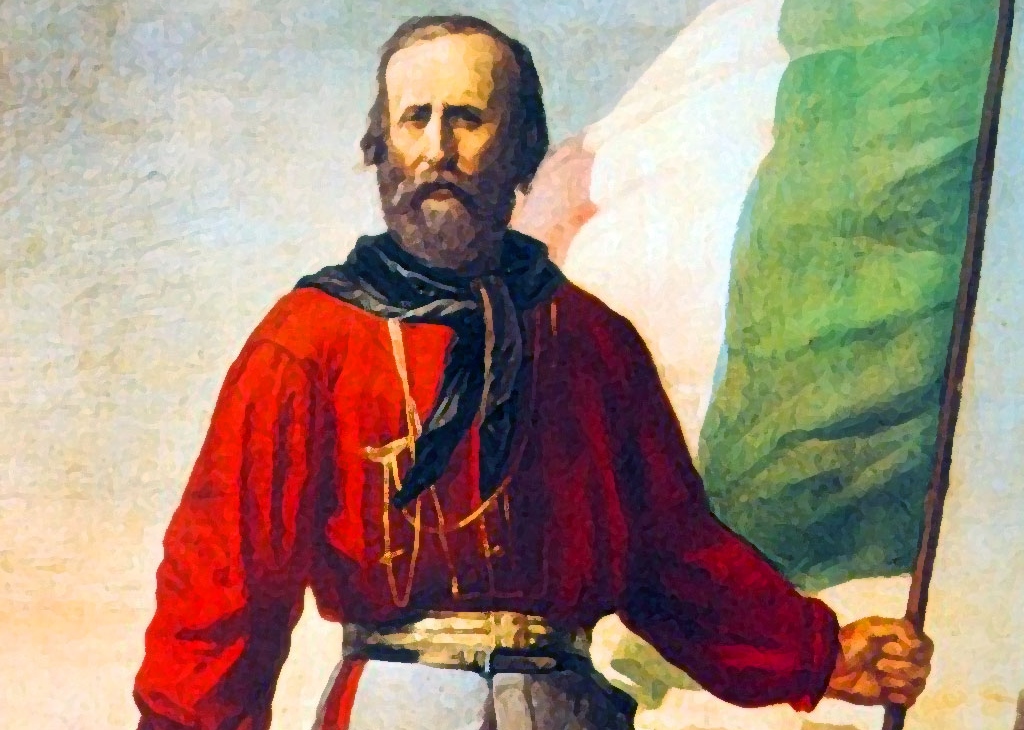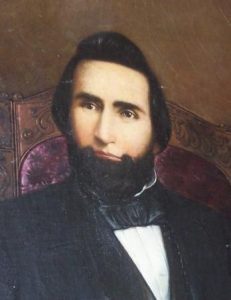What if…Garibaldi Had Commanded the Union Army?
The near catastrophe at Manassas in July 1861 left the Lincoln administration, the Union Army, and many citizens of the North in a state of shock. Just six days following the battle, the president directed Secretary of State William H. Seward to reach across the Atlantic in search of new leadership. Seward instructed Henry S. Sanford, American minister at Brussels, to journey to Caprera, an island off the coast of Sardinia in the Mediterranean, and call on a man who had become known as “the hero of two worlds:” European revolutionary Giuseppe Garibaldi.

Americans had a special connection with Garibaldi. Following an astonishing military triumph that culminated in the short-lived Roman Republic of 1849, the French native turned Italian nationalist eluded far superior numbers of French and Austrian armies bent on capturing him. Garibaldi arrived as a refugee in New York City in 1850 and received a thunderous welcome. He lived in New York for a year, working in a candle factory on Staten Island. He eventually returned to Italy and led about a thousand volunteers, conquering the island of Sicily in 1860. By the beginning of the American Civil War, Garibaldi was an immensely popular, inspiring the 39th New York Volunteer Infantry to name themselves the Garibaldi Guard.[1]
Efforts to recruit Garibaldi for service in the Union Army had begun even before the debacle at Manassas. American counsel to Antwerp James W. Quiggle wrote him on June 8, 1861 and received a reply stating that he would likely come if events in Italy did not require his services. Garibaldi linked abolition in America to a broader crusade for universal human rights and freedom. On July 4, Quiggle informed him that the federal government had no intention of emancipating slaves, though Union victory would likely result in the end of slavery. By the time Seward and Sanford joined the recruiting team, Garibaldi’s services had become “earnestly desired” and Lincoln promised a major general’s commission.

Once leading newspapers learned that Lincoln was courting Garibaldi and dangling high command, they began publishing reports, rumors, and opinions on the potential appointment, complicating negotiations and turning the affair into an international public spectacle. Would the revolutionary’s guerrilla tactics help General Winfield Scott’s army fight more successfully against the rebels? Would Garibaldi’s involvement lessen the likelihood of Britain or France recognizing the Confederacy, given his reputation as a freedom fighter? Was Garibaldi qualified to lead a conventional army?
On September 9, Sanford reported that the situation was hopeless. Garibaldi had misunderstood Lincoln’s offer, believing that he was to become commander-in-chief, a role that the US Constitution reserves for the president. He had further insisted on the authority to emancipate enslaved people. Sanford worried that American officers would become jealous of the European hero. Garibaldi did not join the Union Army in 1861, but the transatlantic political romance was not yet dead. Garibaldi pledged that if the rebellion against the US government dragged on and the conflict became a war of liberation, he would consider coming in the future.

While the American Civil War intensified, Garibaldi attempted to complete the unification of the Italian peninsula. He made an audacious assault on Rome from Sicily without the support of the new Italian kingdom in the north and was wounded and captured in defeat. While Garibaldi was recuperating, Lincoln’s close friend Theodore Canisius, counsel at Vienna, wrote him in early September 1862 to reopen negotiations. Lincoln issued the Preliminary Emancipation Proclamation two weeks later, which confirmed that the war’s central aim was slave liberation in the minds of many European radicals. On October 5, King Victor Emmanuel II granted Garibaldi amnesty for his ill-conceived Roman adventure. Two days later, the wounded warrior sent an emissary to Minister George P. Marsh, calling America his “second country.” Garibaldi vowed to call on “all the democrats of Europe to join us in the fighting of this holy battle.”
But Garibaldi did not come. Canisius was removed for violating the US policy of neutrality on Italian affairs and efforts to recruit Garibaldi ceased.[2] In 1866, the fifty-nine-year-old Italian patriot took up arms again, fighting to liberate Venetia from Austrian rule. His 40,000 troops defeated the Austrians in one battle, but Italian regulars performed poorly. In 1867, he attacked Rome and failed. In 1870, he fought for France. Following his death in 1882, Garibaldi’s fame achieved cult-like status in Italy and beyond. His reputation as a brave warrior for freedom and his presence in historical memory, combined with the uneven reputation of General George McClellan, has prompted some Civil War enthusiasts to wonder what might have happened had Garibaldi accepted a commission in the Union Army, or even commanded all US forces.
Garibaldi’s charisma and reputation as a leader of volunteers might have made him an iconic figure in the ranks, possibly on par with Robert E. Lee, but it is hard to imagine him rallying many more recent European immigrants and their sons to the Union banner than the estimated 325,000 who hailed from the former German states and Ireland alone. He was an expert in guerrilla warfare, which hardly qualified him to lead a huge, modern fighting force. His skills and experience might have served him better in leading a brigade or division, rather than an entire corps or army. Even Garibaldi’s most sympathetic biographers admit that his scant facility with the English language would have posed serious challenges.
The romantic idea that Garibaldi might have provided better early leadership or possibly have helped win the war sooner, given the flux in Union high command, is not supported by historical events as the conflict grew in scale and savagery. Even West Point graduates with conventional combat experience like Grant, Lee, and Sherman had to learn and adapt on the fly. Their training and experiences were far superior to a popular insurrectionist like Garibaldi, whose symbolic importance trumped his military value. Lincoln learned hard lessons by creating political generals and promoting officers like McClellan and Sigel to positions beyond their talent and/or experience. By the summer of 1863, many leadership issues in US Army high command had been resolved, albeit at the cost of untold thousands of additional casualties. Could some of this carnage been avoided with stronger senior leadership earlier in the war? That is a “what if” question worth debating.
David T. Dixon is the author of Radical Warrior: August Willich’s Journey from German Revolutionary to Union General (Univ. of Tennessee Press, 2020).
[1] [1] Biographies of Garibaldi abound. George Macaulay Trevelyan’s monumental three volume work, published between 1907 and 1911, was described by the author himself as motivated by a “political sympathy with the passions of the Italian patriots of the period.” Joseph M. Hernon, Jr., “The Last Whig Historian and Consensus History: George Macauley Trevelyan, 1876 ? 1962.” The American Historical Review 81:1, 1976, 66– 97. A balanced and novel approach to Garibaldi’s life story is Lucy Riall, Garibaldi: Invention of a Hero (New Haven: Yale University Press, 2007).
[2] Harold R. Marraro, “Lincoln’s Offer of a Command to Garibaldi: Further Light on a Disputed Point of History,” Journal of the Illinois State Historical Society 36:3 (Sept. 1943), 237– 70.

https://amp.theguardian.com/world/2000/feb/08/rorycarroll
https://www.battlefields.org/learn/primary-sources/giuseppe-garibaldi-president-lincoln
Some interesting things.
A re-print of various British newspapers in the 14 October 1861, ‘Richmond Daily Dispatch’.
Garibaldi and the potential for an American venture is cited in a few copies.
http://www.perseus.tufts.edu/hopper/text?doc=Perseus%3Atext%3A2006.05.0296%3Aarticle%3Dpos%3D2
In the American North during the Civil War, there were “senior officers supported by the Political Leadership (i.e. President Lincoln, SecState Seward, SecWar Stanton, etc., etc.,)” and there were “senior officers supported by the Clique of West Point.” Although the United States political leaders may have fancied Carl Schurz, Giuseppe Garibaldi, or Franz Sigel for more senior command positions (in order to curry favor with recent immigrant communities, and appease feckless newspapers) the Professional Officers of West Point had self-promotion (from within their group of Military Academy graduates) as a non-stated goal. Thus, not only were Garibaldi and Sigel not supported by West Point graduates; but John C. Fremont (a Regular Army officer, but not West Point trained) was intentionally “white-anted;” and John Logan (arguably the best non-USMA general acting for the Union) was “kept at arm’s reach” from significant command during the war.
In order to grasp how short would be the tenure of Garibaldi as Union Army Commander, one need only examine the career of Major General John Fremont as Commander, Department of the West. Fremont completed his Lincoln-assigned acquisition of deadly arms in Europe and arrived in St. Louis end of July 1861… and was blamed for being late to arrive; blamed for the death of BGen Lyon; and accused of “intrigue and suspicious motives, for bringing ‘Germans in gaudy uniforms’ into his inner circle, ahead of West Point graduates.” Every failing in the West was blamed on Fremont until he was removed from command of the Department of the West at the end of October 1861, after about three months in country.
Garibaldi possessed too much “European baggage,” non-English language focus, and non-American “life experience” to ever be accepted by Professional Army officers, trained at West Point… and would never have been given any real opportunity to succeed in “too senior” a role.
[My assessment, based on the careers of Schurz, Sigel, Fremont, Logan, and Asboth.]
Don’t agree 100% with 100% of your content there, but that’s small potatoes by far.
An excellent notation!
i agree … the language barrier was a show stopper … and Garibaldi would been “right off the boat” phyically and culturally — just not a good fit … whereas the Germans had immigrated in the early 1850s … and they were fairly accomplished men with stong connections to their ex-pat communities … several of them had also been in the Prussian Army … Garibaldi had none of that to recommend him … the Germans, performance wise, were a mixed bag — Osterhaus and Von Steinwehr had war good records … but Schurz, Sigel, Blenker, Schimmelfenning, et al were C minus players at best.
I’ve always thought this was an intriguing possibility, but the post points out correctly why it would have been a bad idea. Thanks.
There used to be a submarine sandwich shop in Tarrytown, New York, called “Hungry Heroes”. Each of the subs was named after a famous man from history ofwho is commonly seen as a hero. A play on words, as the word “hero” is also another name for a sub sandwich.
Except, perhaps, for the Henry VIII (roast beef), who isn’t seen as a hero by a great many. And the William Tell (ham and Swiss cheese), who is a fictional character.
Anyhoo, the Italian sub was called the Garibaldi.